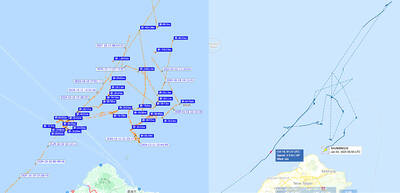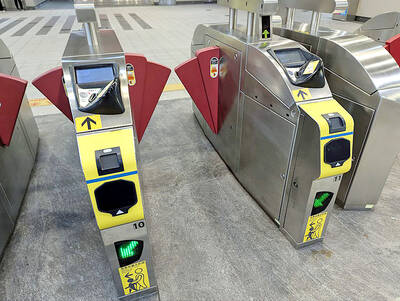The average exposure to medical radiation of Taiwanese has slightly increased to 3.44 millisievert (mSv) this year from 3.11 mSv in 2016, the National Health Insurance Administration (NHIA) said yesterday.
Despite the increase, the average amount remains much lower than 100mSv, the maximum amount suggested as safe by the American Association of Physicists in Medicine, it said.
The agency made the remarks as it introduced a new function on its mobile app, My Health Bank, that allows users to estimate their annual exposure to medical radiation.

Photo: Lin Hui-chin, Taipei Times
People are exposed to several natural sources of radiation, such as cosmic radiation, and radiation released from the Earth and radioactive particles in food, NHIA Director-General Lee Po-chang (李伯璋) said.
This adds to radiation from medical exams, Lee said, adding that different diagnostics release different amounts of radiation.
The overall amount of exposure correlates to the risk of getting cancer and other health conditions, Lee said.
Lin Yu-chun (林右鈞), a radiation specialist at NHIA, said that 8.07 million Taiwanese underwent exams that exposed them to radiation on an annual average from 2016 to last year.
Those who underwent such diagnostics did so 4.14 times on an annual average, with an exposure of 3.3mSv, Lin said.
The average exposure grew from 3.11mSv in 2016 to 3.47mSv last year, but had as of September slightly dropped to 3.44mSv, he added.
NHIA data showed that in the first nine months of this year, 6.55 million chest X-ray exams were performed, as well as 4.38 million X-ray exams on the lower limbs and 4.27 million on the spine.
The amount of radioactive exposure varies among those exams, he said, adding that the association considers annual exposure of less than 100mSv to be safe.
Lin said that 51.3 percent of the 8.03 million people who were last year exposed to radiation during medical exams received less than 1mSv.
Only 0.02 percent of them, or 1,232 people, were exposed to more than 100mSv, he said, adding that most of the high-exposure patients received radiation treatments, he said.

A strong continental cold air mass and abundant moisture bringing snow to mountains 3,000m and higher over the past few days are a reminder that more than 60 years ago Taiwan had an outdoor ski resort that gradually disappeared in part due to climate change. On Oct. 24, 2021, the National Development Council posted a series of photographs on Facebook recounting the days when Taiwan had a ski resort on Hehuanshan (合歡山) in Nantou County. More than 60 years ago, when developing a branch of the Central Cross-Island Highway, the government discovered that Hehuanshan, with an elevation of more than 3,100m,

Death row inmate Huang Lin-kai (黃麟凱), who was convicted for the double murder of his former girlfriend and her mother, is to be executed at the Taipei Detention Center tonight, the Ministry of Justice announced. Huang, who was a military conscript at the time, was convicted for the rape and murder of his ex-girlfriend, surnamed Wang (王), and the murder of her mother, after breaking into their home on Oct. 1, 2013. Prosecutors cited anger over the breakup and a dispute about money as the motives behind the double homicide. This is the first time that Minister of Justice Cheng Ming-chien (鄭銘謙) has

SECURITY: To protect the nation’s Internet cables, the navy should use buoys marking waters within 50m of them as a restricted zone, a former navy squadron commander said A Chinese cargo ship repeatedly intruded into Taiwan’s contiguous and sovereign waters for three months before allegedly damaging an undersea Internet cable off Kaohsiung, a Liberty Times (sister paper of the Taipei Times) investigation revealed. Using publicly available information, the Liberty Times was able to reconstruct the Shunxing-39’s movements near Taiwan since Double Ten National Day last year. Taiwanese officials did not respond to the freighter’s intrusions until Friday last week, when the ship, registered in Cameroon and Tanzania, turned off its automatic identification system shortly before damage was inflicted to a key cable linking Taiwan to the rest of

TRANSPORT CONVENIENCE: The new ticket gates would accept a variety of mobile payment methods, and buses would be installed with QR code readers for ease of use New ticketing gates for the Taipei metro system are expected to begin service in October, allowing users to swipe with cellphones and select credit cards partnered with Taipei Rapid Transit Corp (TRTC), the company said on Tuesday. TRTC said its gates in use are experiencing difficulty due to their age, as they were first installed in 2007. Maintenance is increasingly expensive and challenging as the manufacturing of components is halted or becoming harder to find, the company said. Currently, the gates only accept EasyCard, iPass and electronic icash tickets, or one-time-use tickets purchased at kiosks, the company said. Since 2023, the company said it